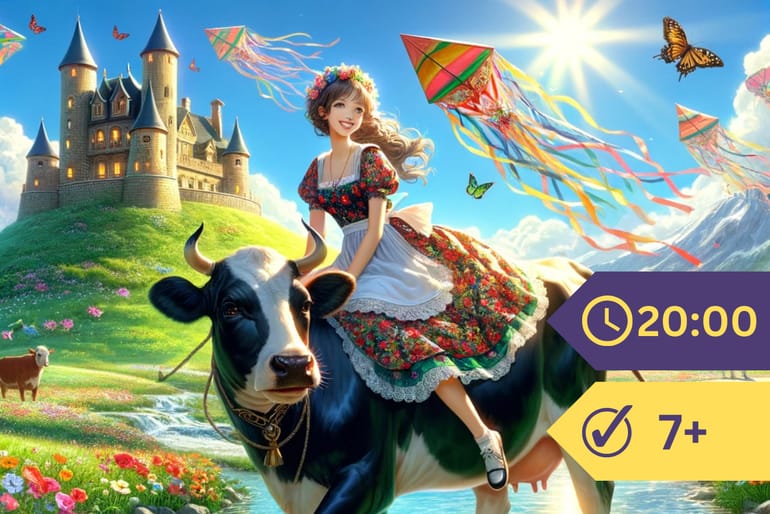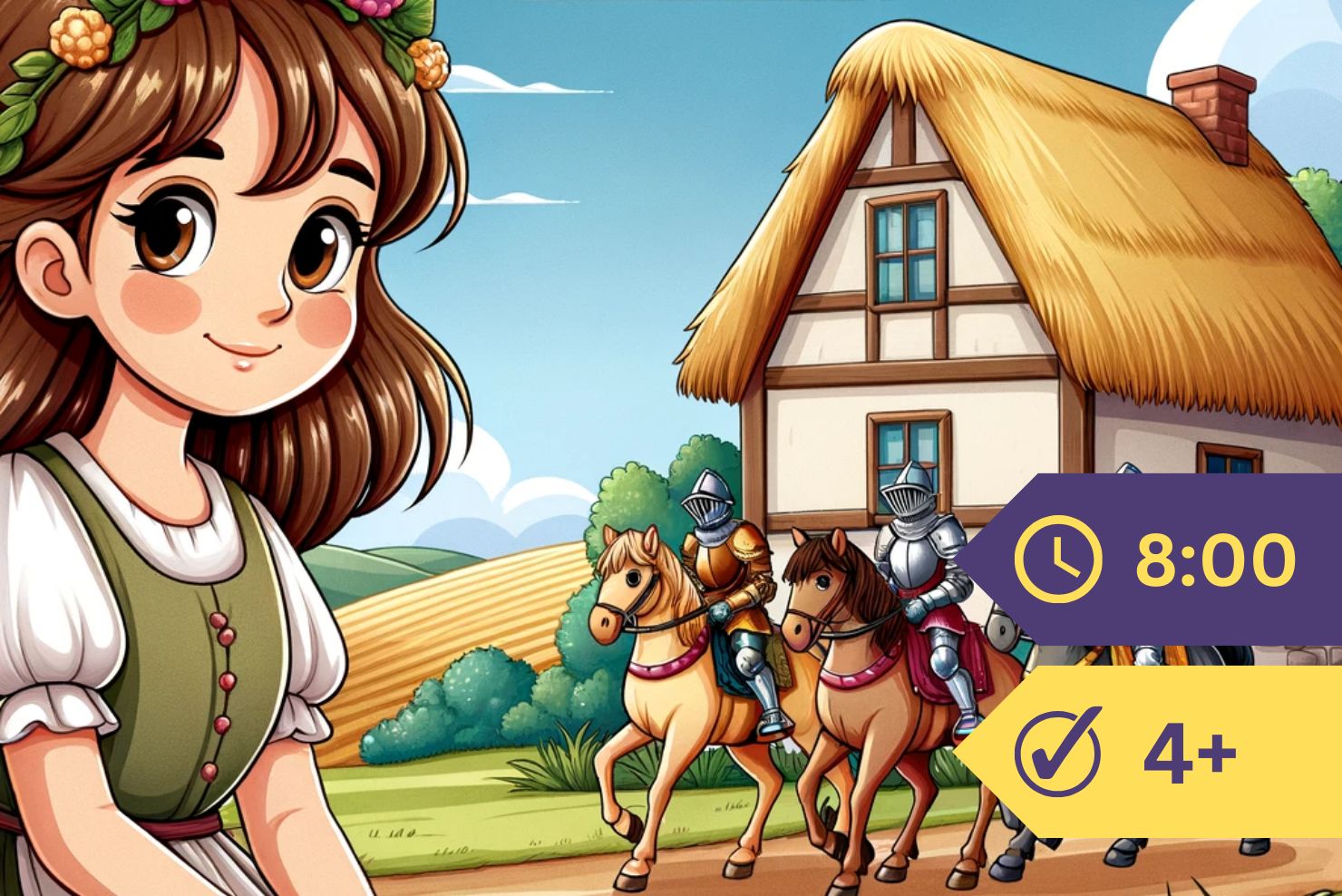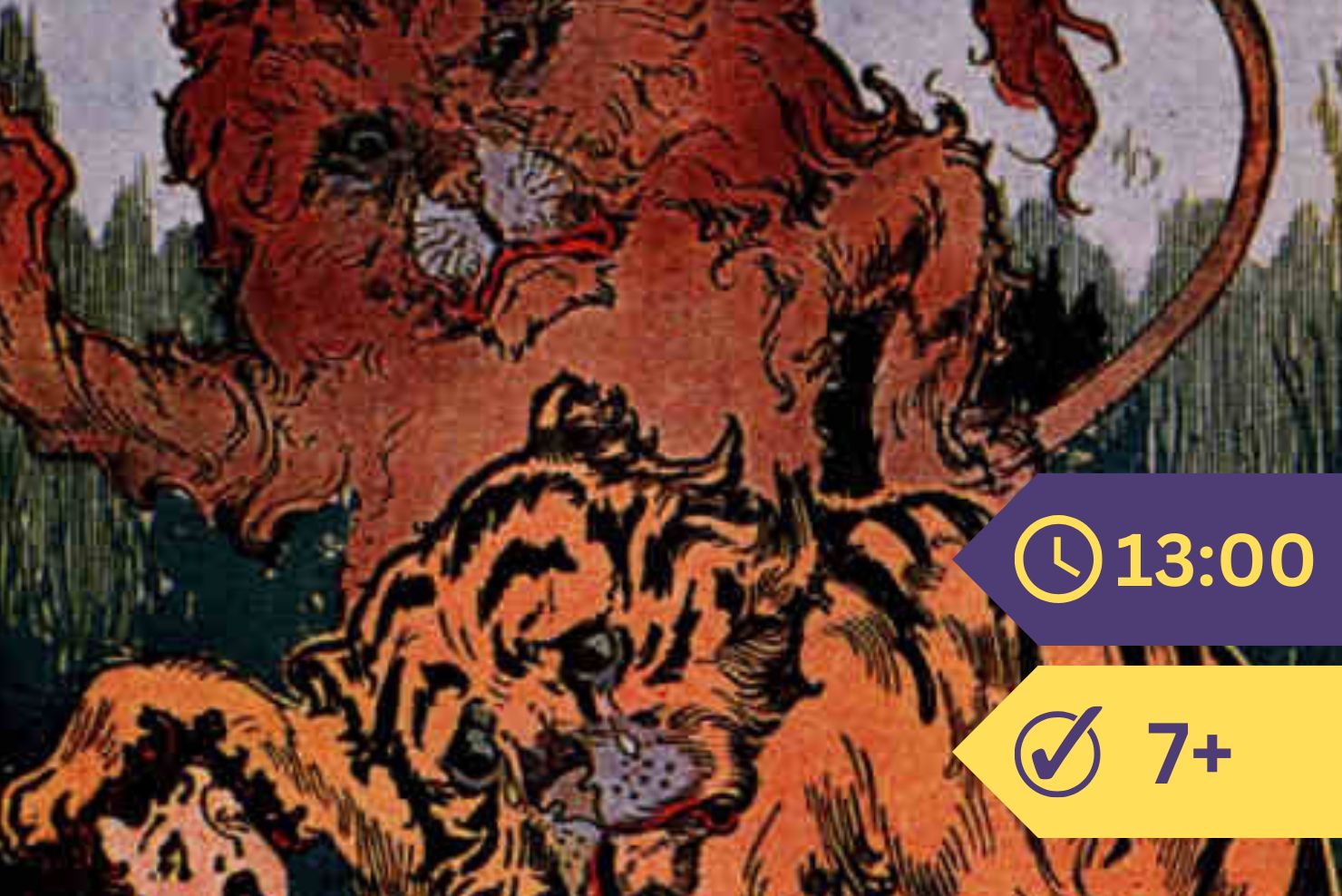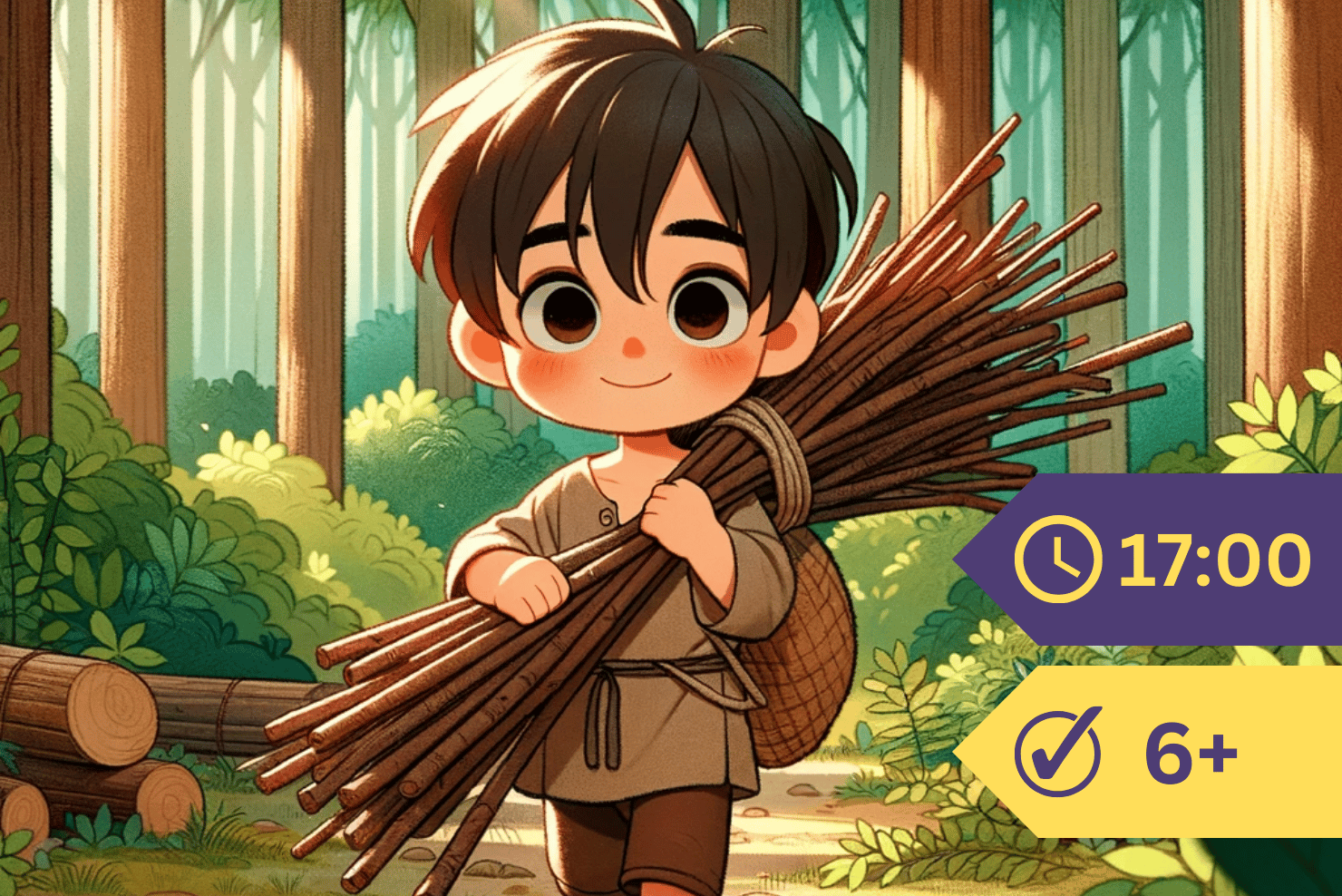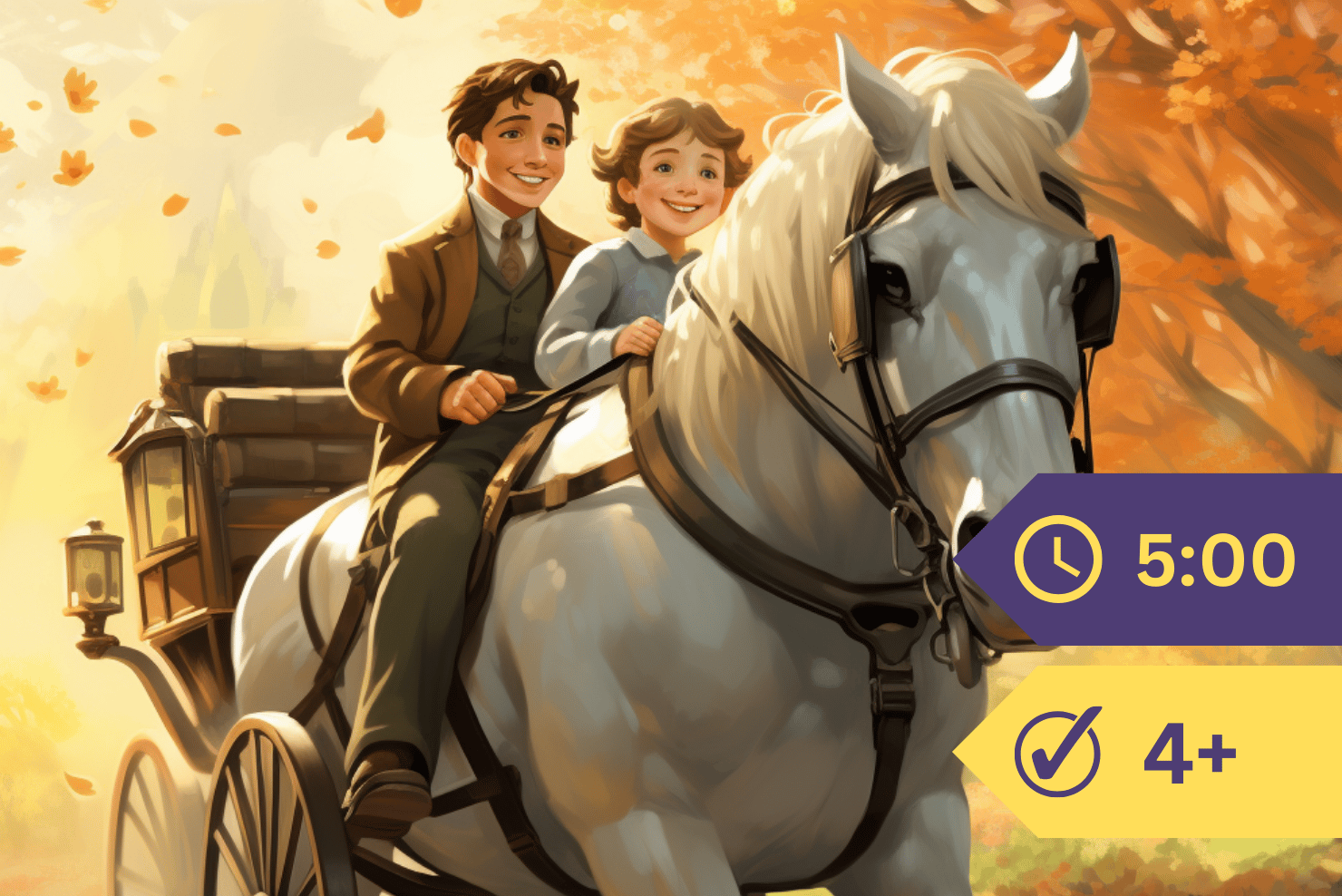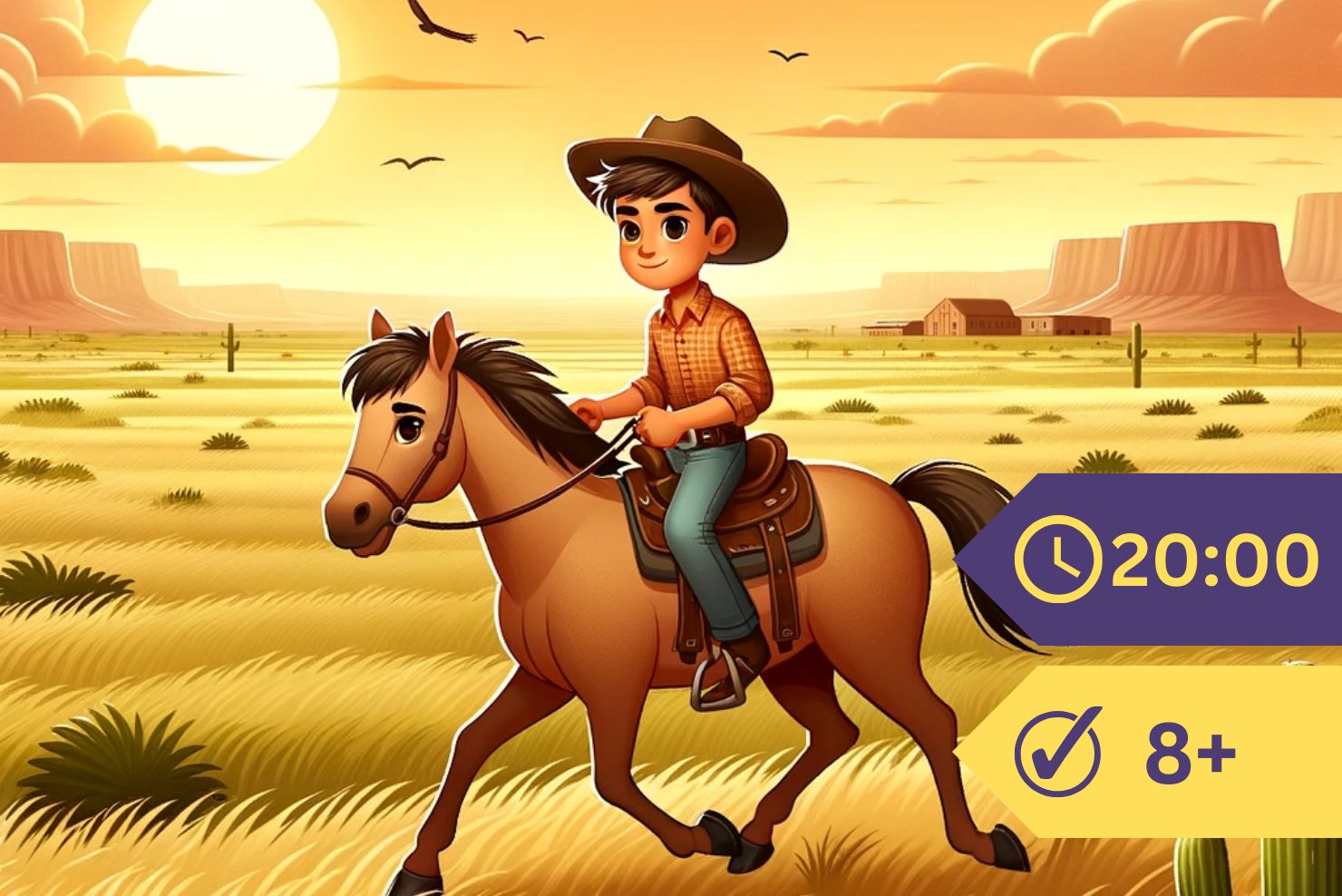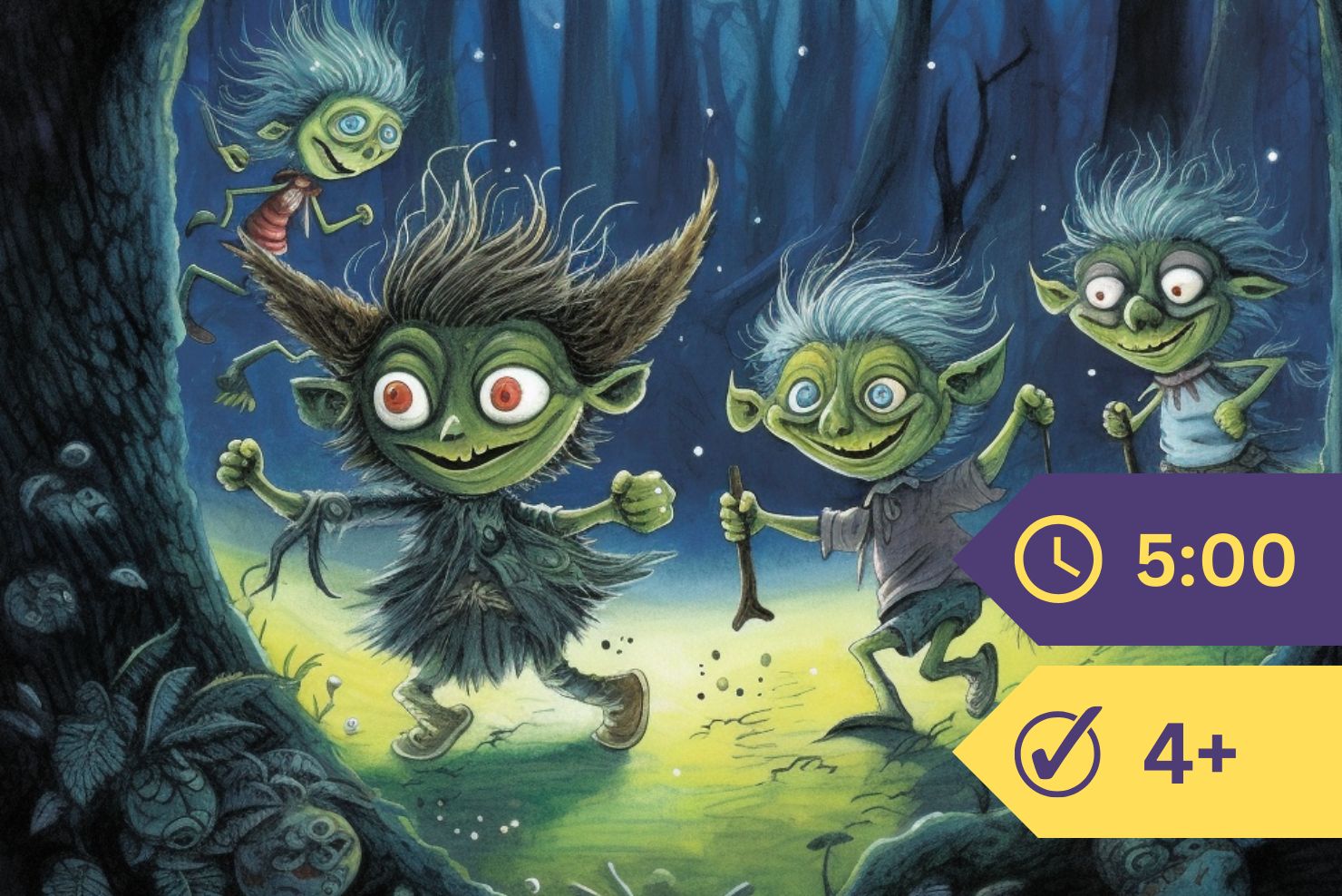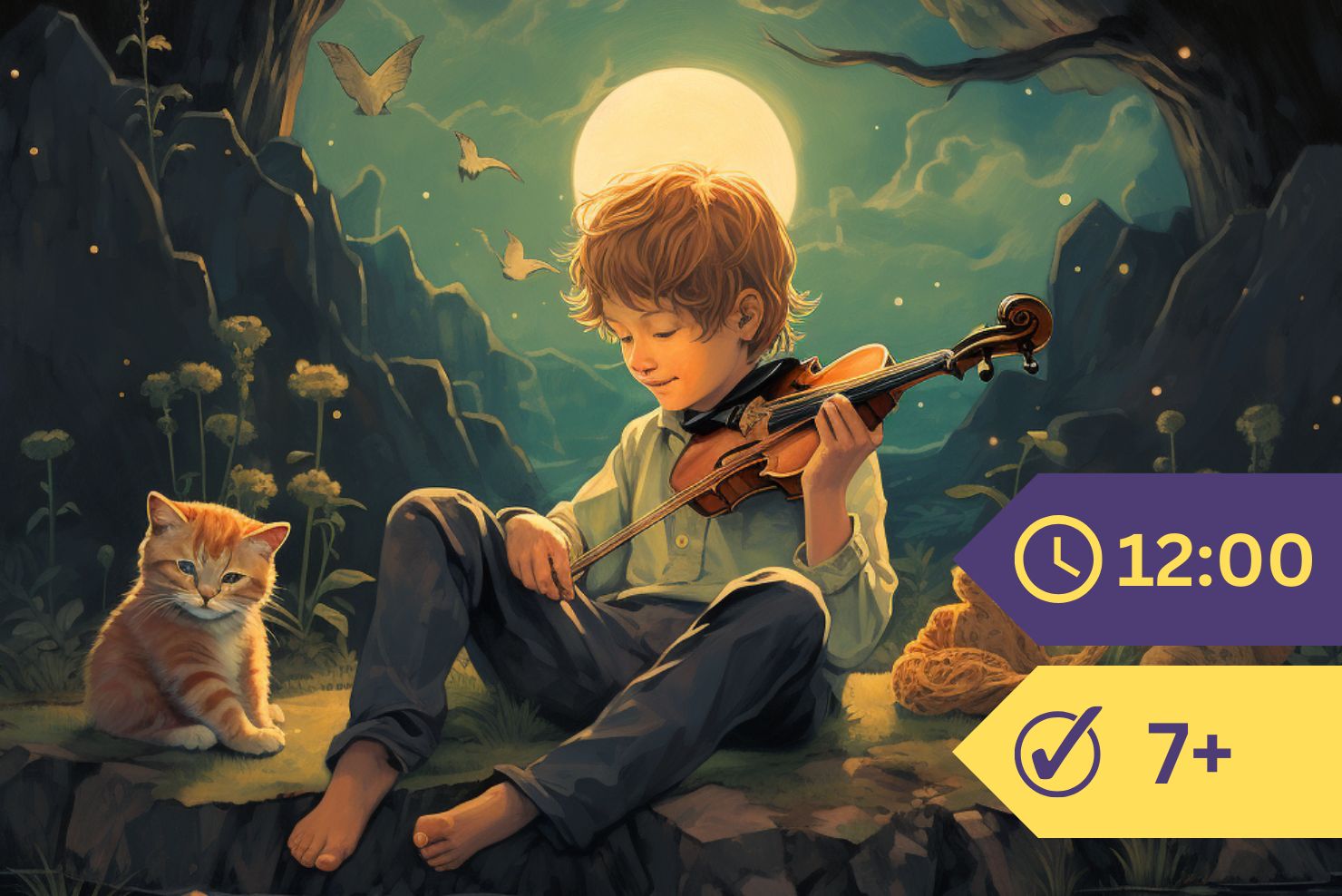There was once a maid who tended her mother’s cow each day, watching it in the pasture, leading it to drink at the brookside, and driving it home through dewy lanes at evening.
Never was such a faithful cowmaid! Pipe who would, or call who did, none could tempt her from her charge.
The cow that the maid watched was as black as a raven’s wing except for one white hair, and that grew on her forehead.
“The elves have left their mark upon her,” said the mother, and because of this fancy, the cow was called Elfin.
Every morning and every night the cow gave milk as sweet and yellow as the cowslip that bloomed in the pasturelands. The butter that was churned from the milk was like gold and brought a good price in the market. The maid and her mother lacked for nothing as long as Elfin, the cow, let down her milk to them.
Now one day as the maid watched the cow in the pasture, she heard a goose-girl and a shepherdess and a swineherd talking together; and all their talk was of the King of the next country.
He was a new King, and what he might do or might not do there was no telling; but great things were expected of him. And everybody thought that he would have tournaments and feasts and merry-makings in plenty, for he was young and full of happiness.
The swineherd had learned all this and much more, too, from his brother, a ploughboy, who had talked with a packman just come from a fair in the young King’s country.
“There is no end to what the packman told,” said the swineherd.
“And what is the King like? ” asked the goose-girl.
“Well, that,” said the swineherd, “I did not hear; but I’ll warrant ye he is like any man with eyes to see with, and ears to hear with, and legs to carry him about.”
“But has he wit in his head? ‘ cried the shepherdess. ‘If he has, he is not like to you.’
“The packman told my brother, the teamster, and my brother, the ploughboy, told me that there was no wiser king than this one,” said he.
“And what of the Queen? Is she as beautiful as the King is wise? ” questioned the goose-girl.
“There is no queen, but the packman telleth of a prophecy about one,” said the swineherd.
‘A prophecy!’ cried the goose-girl and the shepherdess. “And what did it say?’ they asked.
The swineherd could not for the life of him remember.
‘Tis old, though,” said he, “older than anybody knows; and the packman said that many a one have looked for its fulfilment in the young King’s time. But others say it never has come true and never will.” The swineherd’s talk ran on like a babbling brook, but the maid could stay no longer to listen, for it was time to take the cow home.
“He will tell more tomorrow,” she thought as she drove the cow into the road; and she had it in her mind that she would ask the King’s name then. But what she did upon the morrow you shall hear!
The road that led home was as plain and straight as a road could be, and day after day the cow had followed it. But this day she had not gone a rod when she broke away from the maid and went through flowers and weeds across a hill where no road was.
She would not turn nor stop for all the maid could do or say.
“The sun is low and the mother waits with the milking-pail. Come, Elfin, come,” cried the maid; and she ran this way and that way, coaxing and calling, and even striking the cow with a willow switch that she broke from a bush.
But Elfin-cow only swished her tail across her back and plodded steadily along as if she knew right well whither she would fare and how to go.
And the maid went close at her heels. Not once did she lose the cow from sight, for, thought she:
“If I leave her, she may fall into a pit, or wander into woods where the wolves live, or, escaping them, a thief may take her.”
Through bush and bramble and burdock and brake they went, till they came to a green glen where never mortal maid had been before, though this the cowmaid did not know.
The turf of the glen was as soft and thick and green as moss in the deep forest, and upon it grew a thousand flowers, some white and star-shaped, some with tiny bells, and some with silvery cups to hold the dew.
The black cow knelt among them to rest, chewing her cud and blinking her eyes as contented as if she were at home. And the maid, nibbling a crust left from her midday meal, and thinking of her mother, sat down at Elfin’s side.
She had not sat there long when her eyelids grew heavy and her head began to nod. The sun had scarce gone down and the moon had not come up, when she was fast asleep. And the cow’s back was her pillow.
As she slept she dreamed that all the fairy folk came flocking to the glen. Trip-tip, their feet were as light as the breeze upon the grass, and their faces were flower-fair.
And the maid dreamed that strange talk passed between the cow and them.
“Will she go to the journey’s end?’ asked the fairies.
“Aye,” answered Elfin, ‘she will go where I go, though it be to the world’s end.”
“Then there is no time to lose,” cried the fairies, dancing and whirling and twirling through the glen as if they had gone joy-mad.
“Who will make the crown? ” asked the cow, though what crown or whose crown she did not say. 1 The elves will make the crown and the wedding slippers, and we must take the measures,” said the fairies; and fetching a grass blade, they measured the maid’s foot; and they wound a vine about her head.
“Oh!’ said she laughing, for a leaf of the vine tickled her forehead, and she awoke quickly.
Elfin-cow was awake, too, swish went her tail across her back. The moon was bright and the flowers stirred as a breeze went by. But of fairy folk there was no sign.
As the maid rubbed her eyes and stared about her, the cow bestirred herself to journey. Neither petting nor coaxing nor scolding could make her lie down on the turf again. Travel she would and the maid must follow.
By hollow and holt and heath, they went till they came to a wood where never mortal maid had been before, though this the cowmaid did not know.
Oak-tree and ash-tree, hazel-tree and silver-birch glimmered in the moonlight; and beneath them grew a thousand ferns, some with plumy fronds, some like straight green lances, and some as delicate as lace.
The cow lay down among them as contented as if she were at home, and the maid sat beside her, wondering when and where this strange adventure would end.
As she sat there her head began to droop and her eyes to close. The moon had not reached its greatest height when she was fast asleep with the cow’s back for her pillow. No sooner was she asleep than she dreamed that a shoemaker elf sat beneath a hazel-tree working as busily as if everything in the world depended on his hammer’s tap.
“Ho, Elfin-cow,” he called. “The slippers will be ready in a blink of an eye and a swish of your tail.”
The maid was curious enough to know whose slippers these might be, but before she could ask the question, the cow blinked an eye, and swished her tail across her back.
“Finished! Finished!” called the elf, throwing his cap into the air and twirling on his tiny toes as if he had gone joy-mad.
The cap fell upon the maid’s face and the feather that was in it tickled her nose.
“Oh,” said she laughing, and she awoke straightway.
Elfin-cow was awake, swish went her tail across her back. The ferns stirred in the passing breeze, and a woodpecker tapped on a tree nearby. But of the shoemaker elf there was no sign.
The maid sat puzzling as to what these dreams might mean, but the cow bestirred herself to journey. Neither gentle word nor cross word could make her lie among the ferns again. Travel she would, and the maid must follow.
Through dingle and dale, by fen and fell, they went, till they came to a hill where never mortal maid had been before, though this the cowmaid did not know.
Neither tree nor bush nor fern nor flower grew upon the hill. The grass was scant and dry between the lichen-covered rocks, and on the field at the hill’s foot, a thousand stones gleamed white and cold in the waning moonlight.
The cow lay down among the stones as contented as if she were at home, and the maid sat beside her, though it seemed a weird and lonely place in which to rest.
Yet she could not keep awake. No sooner had she sat down than drowsiness overcame her. The moon had not finished its course in the sky when she was fast asleep.
As she slept, she dreamed that little men with wrinkled faces and long beards came trooping from the hill. Their legs were no larger than barley straws, and their eyes twinkled and laughed beneath their bushy eyebrows.
And the maid dreamed that they knew Elfin, and that the cow knew them.
“The cock crows, and night goes,” cried Elfin warningly as they came.
“Aye, but the work is done,” said the little men, and stamping on the stones as if they had gone joy-mad, they lifted up a golden circlet, dazzling bright.
‘Oh! ” said the maid laughing, for the splendor of it hurt her eyes. And she awoke to find the sunlight of a new day on her face.
Looking about she saw, not far away, a river flashing in the morning light, and beyond that a city with white towers and spires of gold; and, farther still, the sunny fields and soft blue hills of a fair land, the fairest she had ever looked upon. “Oh, Elfin-cow, is yonder Fairy-land?” she asked, and if the truth were told, she more than half expected that the cow would answer her!
But Elfin, sniffing the scent of the new day’s air, was up and off without so much as a backward glance. She did not stop again till she had come to the shining river’s brink. And the maid followed all the way.
As far as the eye could see, the river ran like a silver road between green banks, but though the maid looked up the stream and down, she could spy no bridge; and she began to hope that here the cow would turn about and travel homeward.
But when the cow had drunk her fill at the river’s edge, she stood and gazed across the water longingly as if home were upon the other bank!
The maid was half beside herself with fear.
“What if the cow should cross the stream? ” thought she. ” How could I go with her? Yet go I must.”
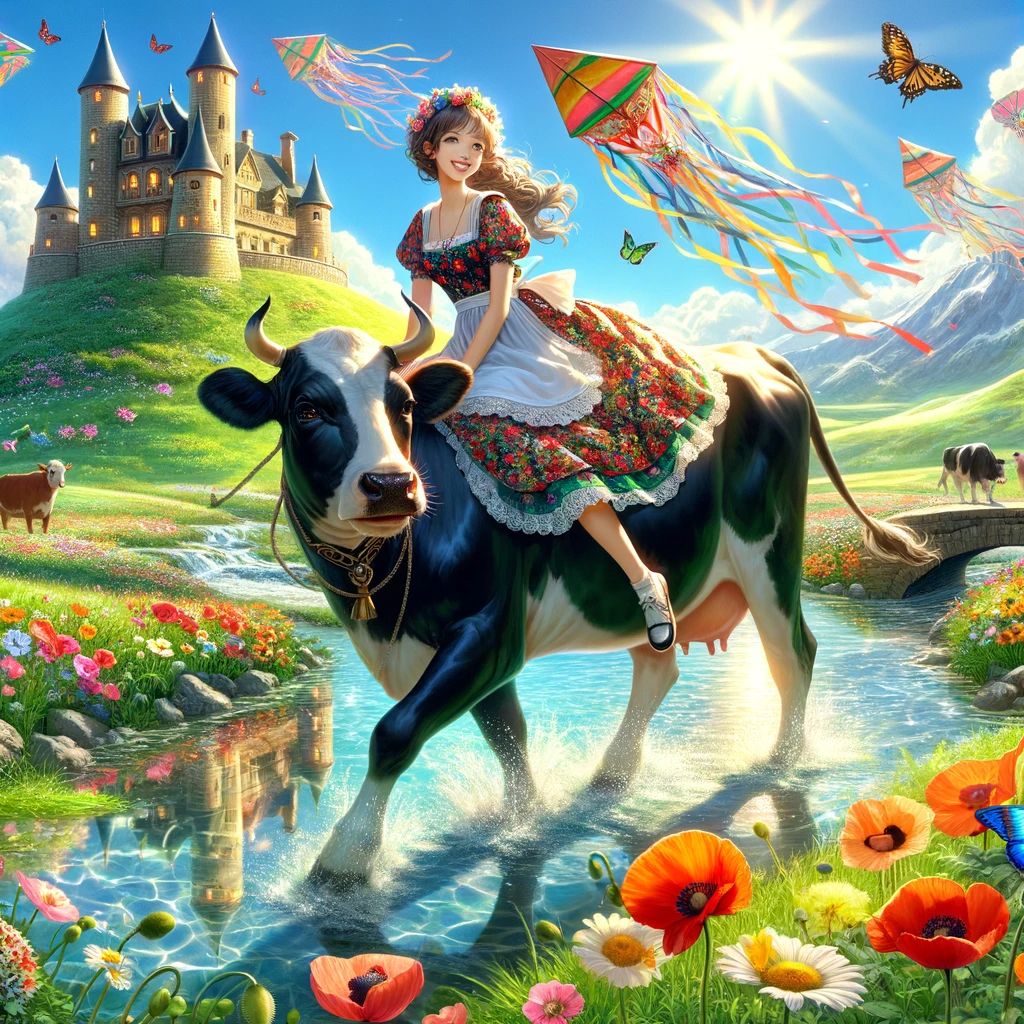
Neither mortal folk nor fairy folk were near to aid her, but as she cast her eyes about, she spied a rock at hand.
As quick as thought she mounted it, and from its height, she sprang upon Elfin’s back. And none too soon! She scarce had time to draw a breath before the cow stepped down into the river.
The water rippled and bubbled and foamed about them. Little waves splashed against Elfin’s sides and sent a rainbow spray above the cowmaid’s head. And in every wave and every ripple and every bubble, a sunbeam shone like a bright jewel. Now the stream grew deep and deeper, and the maid’s heart was in her mouth, but she kept fast hold of Elfin’s horns, and the cow swam steadily as if she had been bred to it. Soon they were safe upon the farther bank.
The white city that the maid had seen was near the shining river, and as the cow, with the maid still on her back, climbed the green bank, a watchman ran from the city gates to meet them.
No sooner had he looked at the cow and looked at the maid than he began to bow and scrape and scrape and bow as if his wits had taken leave of him.
“Oh, lady fair! Oh, noblest queen!” he cried to the maid; and again he bowed and scraped and scraped and bowed. Never was such bowing and scraping.
“I am no lady or noble queen!” said the maid; ” but just a village lass tending my mother’s cow that has gone astray through wood and stream. And as my duty is, I go with her, lest harm befall her. I prithee, sir, give me a halter for her neck, that I may lead her home.”
But the man threw his cap into the air and shouted as if he had gone joy-mad. And another watchman came running from the gate.
No sooner had he looked at the cow and at the maid on the cow’s back than he threw his cap into the air and shouted; and another man coming after him did the same, and another and another, till around the maid and her cow stood a great throng of shouting folk. Some were dressed in rags, and some in smocks, and some in fine attire, but they all shouted alike. There was no end to the noise that they made.
The cowmaid was fairly bewildered with it, but Elfin stood her ground, blinking her eyes and chewing her cud as contented as if she were at home.
“Take them to the King,” cried one of the throng.
“Aye, to the King they must go,” cried each and all.
Elfin-cow went with them through the gate as quietly as if she were on the way to pasture, and the maid sat on her back, looking with wondering eyes at the crowd about them.
If there had been a thousand men outside the wall, there were ten times as many in the city streets, and the shouting was ten times as great; and to make things merrier, the bells in all the steeples began to ring as the cow and the maid went by.
Through street and lane, by houses and towers gay with banners, they went, till they came to a great oak-tree, where the King awaited them.
He was no other than the wise young King of whom the swineherd and the goose-girl and the shepherdess had talked in the pasture; though this the cowmaid did not know. But that he was as handsome as a king should be she saw at once.
The King’s chief counselor stood beside him with a parchment roll in his hand.
“The prophecy! The prophecy! Read us the prophecy,” cried the people, but the counselor would not read until the maid had told her tale from start to finish.
“A good tale and well-told,” said the counselor; then opening his roll, he read slowly and clearly so that all might hear:
“Joy, Peace, Prosperity, In the King’s land there shall be When, with Duty for her guide, On strange steed a maid shall ride Through the river’s silver sheen, Hitherward to be our Queen.”
“Wilt you be my Queen? ” asked the King, smiling at the maid. And the place where they stood was as still as a church on Monday. No one so much as breathed till the maid answered:
“If you wilt fetch my mother and take care of Elfin-cow, I will,” said she. And then such a shout went up as was never heard before nor since in the King’s land. ‘Tis a wonder that the King’s folk did not split their throats that day!
Elfin-cow was given the greenest pasture in the land and two cowmaids and a cowherd to wait upon her, and a silver bell with a golden clapper was hung on a rope of silk around her neck.
And the maid’s mother was fetched in the King’s own chariot to the wedding, which was that very day.
But if you ask about the crown and the slippers that the Queen wore at the wedding, I can only tell what was told to me; they fitted her as if they had been made for her.

